The doors open, and all of the 3 year old preschoolers come running out…
“Mama, I painted today!”
“Mama, we ate cookies at snack!”
“Mama, I played on the slide outside!”
“Mama, I had so much fun today!”
My little girl also comes running out. Her mega-watt smile is turned on high. She hugs my leg and plants some kisses on my hand. But she says nothing. No “Hi, mama!” No “I had fun”. No “I missed you”.
My daughter is 3 1/2 years old, and she is mostly nonverbal. It’s still a gut punch sometimes as I listen to all of the other children chattering to their parents. And I wish beyond wish that I could hear just a fraction of those words from my sweet girl.
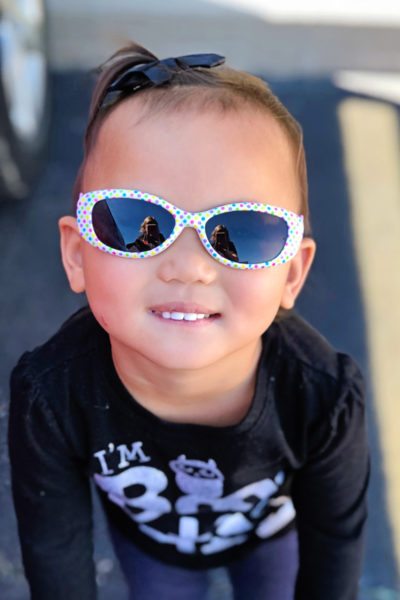
But as I look at the 16 children running around outside the church, I have to remind myself that there is only one child in that group who was close to death and fought her way back.
There is only one child who suffered tremendous neglect and malnutrition in her short life.
There is only one child in that group who spent her first 26 months without a family.
Elena was adopted in June, 2016. Her listed special needs from China were developmental delays, malnutrition, and anoxic brain damage. When we met in China, I could quickly see that Elena had extremely low muscle tone and very hypermobile joints. When she tried to crawl, her arms seemed to bend backwards at her elbows. The muscles in her arms would often just give out under the weight of her body, and she would crash face first onto the hotel floor. Because of this (and because she was completely terrified!), she had little desire to move around much while we were in China. Clearly, I was concerned about her gross motor delays as she was 26 months old and barely crawling.
But my bigger concern was her lack of any attempt to make sounds. She could make sounds when she cried. And she cried plenty! When she cried, she would eventually wail, “Mamamama”. But that was the only time we heard the “mama” sound – when she was in complete distress.
During our entire time in China, she was silent. I would’ve attributed it to the trauma and stress of leaving her foster home and being taken by strange people to a strange place. But in all of the updates I received before meeting Elena, I was told, “She is a very quiet girl. She doesn’t try to talk. She doesn’t make sounds.” Knowing that she was also completely nonverbal in her foster home environment (where she was comfortable), my red flag started waving.
Most people feel that, when you return home from China, you should give your child several weeks or months to let natural development take place before assessing for any kind of therapy. With many children, after an acclimation period, their skills start to take off, and no formal intervention is needed. However, my gut feeling was that Elena’s delays were much more serious than just typical institutional delays. The same week that we arrived home, I made the referral to get Early Intervention services started. I also bumped up our appointment at the IAC to be seen the following week rather than in a month.
At our IAC appointment, the doctor agreed that Elena was showing more delays than was typical for a child coming from an institutionalized setting. She was concerned with how very weak her muscles were and how she had virtually no reflexes. She was also concerned with her seeming lack of ability to produce any sounds. At this point, after being home for just over a week, Elena had already learned close to 25 signs. She was great at imitating gestures, and she picked up on sign language so quickly. She clearly had a strong desire to communicate.
But she was totally unable to imitate a sound. At 26 months old, she should’ve at least been babbling. But Elena was still completely silent.
Several weeks later, we started speech therapy, physical therapy, and occupational therapy through Early Intervention. We started to see some slow improvements with Elena’s gross motor skills. She started crawling more and sitting with better control.
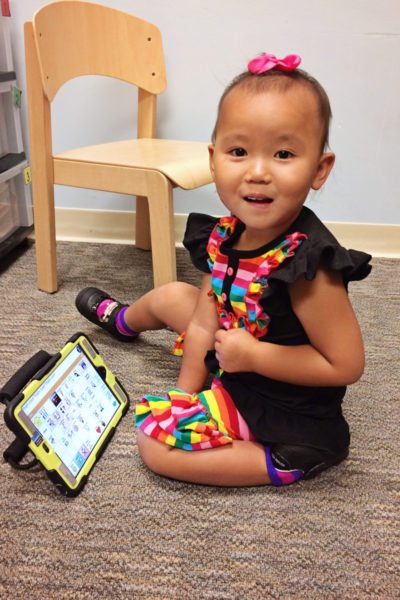
She started cruising and taking some very unsteady steps with her hands held. And about 3 months after her adoption, at 29 months old, Elena finally took her first independent steps!
She continues to have low muscle tone. And gross motor skills are still a challenge for her and take her longer to master. But now, at 3 1/2 years old, she’s starting to run (although I still hold my breath because she trips and falls all the time!), she’s able to jump, she can climb ladders (with some spotting), she takes dance class, and she’s able to ride a bicycle with training wheels.
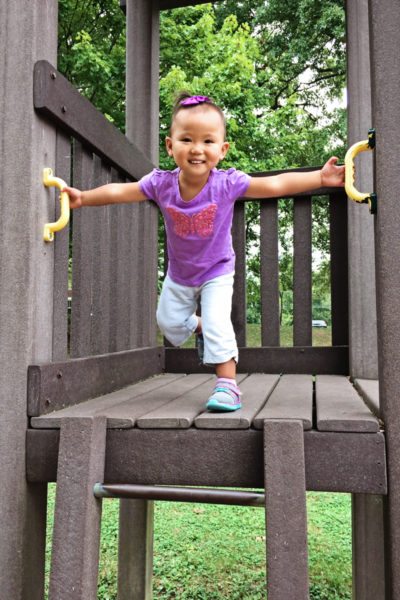
Her speech continues to be our biggest challenge. From the very beginning, every time I took Elena to any doctor/specialist/therapist, they always said, “Has anyone ever mentioned apraxia to you?” And I would reply, “Yes! At another appointment we had 20 minutes ago!” So clearly, apraxia was at the forefront of everyone’s mind from the get go. But it couldn’t be diagnosed when she first came home because she was still obviously in “language shock” as she transitioned from Mandarin to English. And she had no sounds for anyone to evaluate.
Now that she’s been home for 16 months (and has had 14 months of weekly speech therapy), she has been diagnosed with severe (or severe severe as one SLP laid it out) apraxia of speech.
Childhood apraxia of speech (CAS) is a neurological disorder where the brain doesn’t send the right signals to the mouth to produce sounds correctly. If you ever really stop and think about how every part of your mouth is moving when you say a word – your jaw, your tongue, your lips, even how the air is flowing across your vocal cords and from your mouth – you’ll realize that every word you speak requires a lot of coordinated movements. Movements that, for most people are completely automatic and never require an ounce of thought. But for a child with apraxia, that motor planning does not come naturally.
These children typically know exactly what they want to say. And they likely can hear the words in their mind.
But somewhere between their brain and their mouth, signals get mixed up, and sounds do not come out correctly. It’s incredibly frustrating to me as a parent, so I can only imagine how frustrating it is for my little girl!
The past 16 months with Elena have been filled with highs and lows. It’s been amazing watching a beautiful, silly personality emerge from the broken shell of a little girl who was handed to me in China.
And I rejoice in every step of progress that she makes.
But adjusting to parenting a child with severe apraxia and developmental delays has also been incredibly hard. Not because Elena is hard. She’s actually one of the sweetest, most easy-going and cooperative children I’ve ever met!
But hard because I’ve had to surrender my expectations and desires in order to embrace the journey that God is taking me on with Elena. And embracing this journey didn’t happen immediately. Quite honestly, it is still a work in progress sometimes.

If you are newly home with a child with developmental delays, or if you are praying about adopting a child with developmental delays, the rest of this post might be written for you. These are some things that I desperately needed to hear when I was struggling during our early days. And as much as it’s written for you, I need to put these things out there as ongoing reminders to myself!
1. You may not feel an immediate attachment to your child.
If you do, that’s wonderful! But if you don’t, please don’t feel like a failure or a terrible human being. Your child may have more significant developmental delays than you were prepared for, the delays may linger much longer than you anticipated, or your child may demonstrate behaviors you weren’t expecting. Your heart and mind may need time to adjust to your new reality. A reality that may be different from what you hoped for and dreamed about.
But eventually you will remind yourself that you are living according to God’s plan, not yours. And God chose you to parent this child for a reason. Your child might not be exactly who you imagined in your pre-adoption dreams. But your child is fearfully and wonderfully made by God and is exactly who He dreamed of! Attachment will come with time. Give yourself grace.
2. You may compare your child to other children.
You may look at other children who were adopted at the same time as your child, and you’re going to see the things they’re doing and hear the words they’re saying, and you may feel disheartened that your child is not doing these things. You may look at other children in your community and see children half your child’s age effortlessly doing skills you’ve been working on every day. You may have other adopted or biological children with no developmental delays. And you may remember things they did or said at certain ages and feel sad because you know that the window has closed for your child to do or say the same things at the same age.
And then you’re going to repeat to yourself over and over again, “Comparison is the thief of joy” until it becomes ingrained in your mind. It doesn’t mean you won’t still automatically compare at times. Because you probably will. But you’ll learn to learn to move on without feeling like your world is shattering. And you’ll learn to gauge your child’s progress against him/herself rather than against other children.
3. You may have to fill out more developmental assessments/checklists than you care to count.
And when those evaluations and assessments come back saying that your child is X months behind other children, you might feel discouraged, and your heart might break all over again. But then you’ll look at those assessments and tell yourself, “So maybe she can’t repeat ‘7, 2, 5’, build 3 blocks into a chair shape, or walk on a balance beam. But she got a tissue to wipe her sister’s tears yesterday. And she shared her last bite of ice cream because sharing is her nature.”
You’ll remind yourself that those assessments can paint a bleak picture of a beautiful child. And you’ll remind yourself that those assessments don’t measure everything. Sometimes they don’t even address the things that are most important!
4. You’re probably going to need a separate calendar to keep track of therapy appointments.
And it may seem like this will be for the rest of your life! You will leave some therapy appointments feeling very encouraged because your child made a new sound or attempted a new skill. And you will leave some therapy appointments feeling discouraged and beat down because it seems like you’re in the same place as you were an hour earlier.
You might wonder if all of the therapy appointments are even worth it. But you’ll diligently keep taking your child week after week. And at some point, there will be a breakthrough – maybe big, maybe small – and your batteries will be recharged to keep going until the next breakthrough.
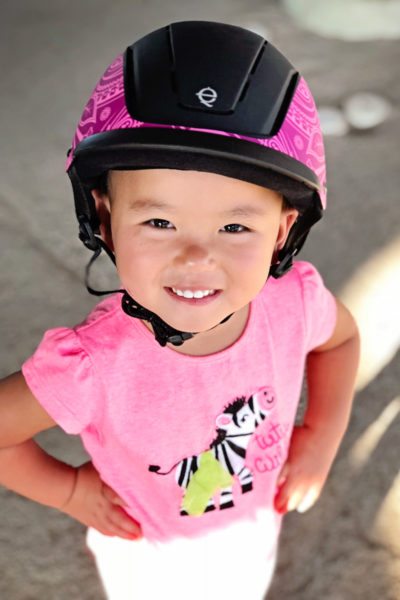
5. You’re probably going to meet a lot of doctors and therapists.
The majority are going to feel like great members to have on your child’s team. Most will be encouraging and supportive and help you to see all of your child’s strengths. But you will occasionally come across someone who won’t be able to look past your child’s present delays. You may meet a doctor who will suggest that your child’s future isn’t promising and who will question her ability to succeed in life. Your first reaction may be to cry. But then you will look at your sweet child sitting there, and you will feel a new fire light under your fight!
You will remind the doctor of your child’s horrific start in life and of the progress she’s made so far. And then you will declare, “Game on! Just watch and be amazed! She may not grow up to be a neurosurgeon, but she’s going to grow up to be the best person she can possibly be! This is my certainty for her future!”
6. You’re probably going to hear and read words that make you cry.
Words from other people like, “All it took was lots of love, nurturing, and good nutrition, and my child’s skills took off!” or “My daughter was completely nonverbal, and now she’s talking up a storm… it’s amazing what a family and lots of love can do!” will probably make you feel like either screaming or crying.
Because you feel like you couldn’t possibly love and nurture your child any more.
Your dedication to your child includes taking her to 5-7 therapy appointments a week, making her vitamin packed smoothies, doing as many enrichment activities with her as you can think of, playing, playing, playing, and talking, talking, talking. But it’s still not enough to overcome the delays. And you might feel like “Maybe if I was just doing a bit more…” Let me tell you that you’re doing everything possible for your child! You are doing an amazing job!
7. You may lay awake at night pondering the “what ifs”.
What if she never talks?
What if the other kids are mean to her?
What if she can’t participate in activities with her peers?
What if she’s changed her sister’s life?
It may be a daily challenge worrying about these “what ifs”. But eventually, you’re going to try to shift your focus from the “what if” to the “what is”.
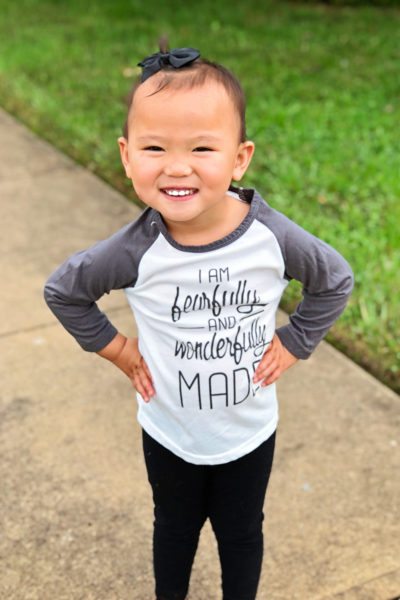
Here is our “what is”…
Elena *is* making progress with talking. It’s painfully slow, and not measurable by most. But considering that, a year ago, she made no sounds, she is at least now learning that she has a voice. And she is trying so ridiculously hard to learn to talk! Harder than any child should ever have to try!
And even though she’s still mostly nonverbal, Elena does a fabulous job of using her signs to communicate what she wants. She has also started using an assistance communication device to express her thoughts and needs. It may just be that Elena’s “talking” is going to look a little different.
Elena *is* loved by her friends at preschool and by the other children in our neighborhood. When she arrives at school, one of her little friends always runs to give her a hug and then holds her hand as they walk in the door together. Another child says to his mom, “Elena is my best friend.” The boys in our neighborhood sometimes fight over who gets to sit next to Elena or play with her.
I get that she’s only 3. Kids at this age don’t see differences as much. Things may change as she gets older. But that’s a “what if”. For now, I’ll treasure the sweet interactions between my girl and her friends.
Elena *is* involved in activities with her peers. She attends dance class every week with one of her friends from preschool. She goes to Sunday school with her big sister. And she loves music class at preschool.
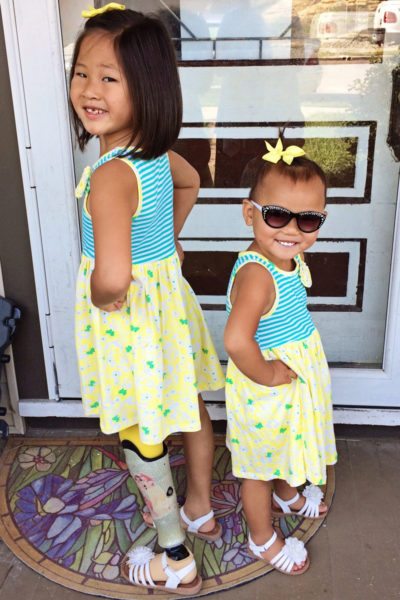
Elena *is* changing her sister’s life… for the better. Elena absolutely adores her big sister! I’m fairly sure that Anna Grace is her favorite person in the entire world. Big sisters are supposed to be annoyed with their little sisters, so we have a fair amount of complaining from Anna Grace. But when the dust settles, Anna Grace enjoys Elena, and she loves her fiercely. While I’m busy worrying about how Elena’s delays are going to affect her relationship with Anna Grace, Anna Grace is busy teaching Elena how to spit water through her teeth. Or how to make a blanket fort. Or how to ride a scooter. All normal sibling things!
Elena wants to do everything that Anna Grace does, and Anna Grace is, hands down, Elena’s best teacher. And while Elena has learned a lot of skills (and some naughtiness!) from Anna Grace, Anna Grace has also learned from her sister. She’s learned to be more patient, to share (sometimes begrudgingly), to cheer for someone else’s successes, and to stand up for someone she loves. Both of their lives are better and fuller because they have each other.
Parenting a child with developmental delays can definitely take you on a different journey than you expected. And just because it’s different doesn’t mean that it’s any less amazing or important.
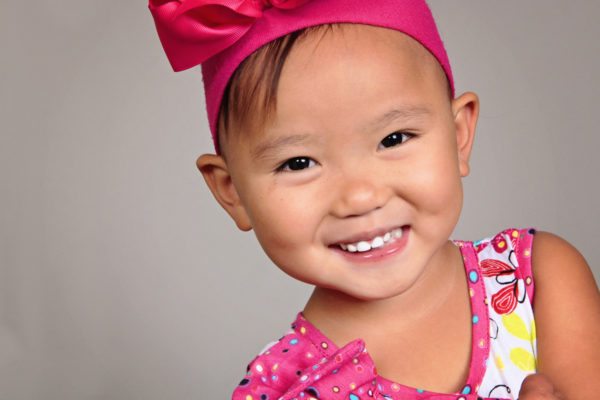
It’s a journey that will teach you to acknowledge every little victory, no matter how inconsequential it seems.
It will teach you to recognize how very hard your child works on a daily basis.
It will teach you to appreciate all of your child’s strengths and see strengths over weakness.
It will teach you to be fulfilled with a hug, a smile, a giggle, and a look in your eyes from a child that, even without words, says, “I love you, and I am yours!”
– guest post by Wynne

























I would love for you to contact me. Our daughter was adopted 5 years ago from China and I could have written this myself. Our daughter is now 7 and a chatterbox, but still not to the level of other kiddos. She was 3 1/2 when she called me “mama” – nearly 1 year after adoption, but now she wraps her arms around me and says “I love you mama!”
I too would love to connect with you. Our son was adopted 1.5 years ago and has severe speech issues too. He is now 11 and communication is so hard. Your article resonated with me so much. It’s nice to know there are others out there with similar struggles.
Elena is beautiful and she is blessed to be part of this beautiful and loving family
I LOVE this. I could have written it all about my biological son who is 3.5. We are four weeks away from bringing home a little boy who is almost 3 and I lay awake at night wondering if I will ever hear the two of them talking and joking with one another. I have all those “what if’s” and worries and feelings. It’s so hard when you leave your bubble of your home and see what all the other children are saying and you wished your child could too. You have the most beautiful girls by the way!